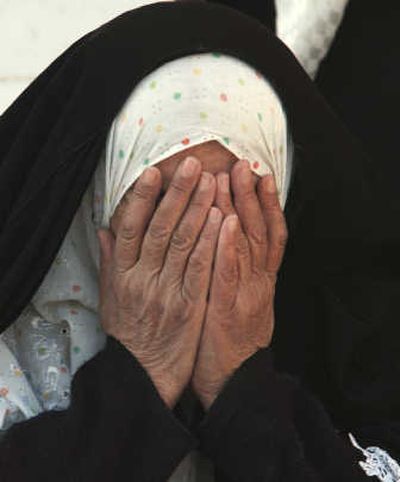Al-Qaida foe killed by suicide bomber

BAGHDAD, Iraq – The suicide bomber walked straight to the Sunni Arab leader of a group battling al-Qaida in Iraq, shook his target’s hand and detonated the explosives wrapped around his body.
Minutes later, as survivors were being moved to safety, witnesses said a second suicide attacker drove into the north Baghdad compound and set off his explosives.
The apparently coordinated attack killed at least 14 people, including Col. Riyadh al-Samarrai, commander of the Azamiyah neighborhood’s citizen security group, police and government officials said Monday.
The U.S. military immediately denounced the attack on the American-backed neighborhood group, blaming al-Qaida in Iraq for finding “new depths of depravity” to fight those who reject its ideology.
By evening, eight bombs in all had exploded in Baghdad neighborhoods east of the Tigris River, killing at least 18 people and injuring more than three dozen. Some officials put the death toll as high as 25 and the injury count at more than 50.
In a separate incident, 20 gunmen ambushed a security checkpoint manned by members of another neighborhood patrol in northeastern Baghdad, kidnapping eight of them, Iraqi government officials said.
Samarrai’s assassination comes as the U.S. military has been heralding the rise of citizens’ groups, known as Awakening Councils, as a key reason for steep reductions in violence. The attack came nine days after Osama bin Laden threatened to punish those who aid Americans.
Since bin Laden’s threat, the attacks have been hitting the capital almost daily and in spectacular fashion. A suicide bomber targeted a funeral that killed at least 34 people on New Year’s Day. On Sunday, at least three Iraqi soldiers were killed in the middle of an Army Day celebration, moments after they had been jubilantly dancing in the streets, shouting, “Where is terrorism now?”
The increased bombings are raising unsettling questions: Can the Awakening movement progress even as leaders have become targets? And is violence in the capital returning after months of relative calm?
“The remnants of al-Qaida (in Iraq) are only trying to prove their existence by choosing random targets,” said Brig. Gen. Qassim al-Moussawi, a spokesman for Baghdad’s security plan. “We did warn our people that it’s not over, to be careful. Our hard efforts for eight months did have positive results, but things will not be perfect just overnight.”
Besides the twin suicide attacks near Azamiyah, Monday’s other explosions did not appear to target specific people. Insurgents hit some of the city’s safer neighborhoods – striking a university, killing at least three students, as well as attacking a restaurant and an ice cream shop.
Student Mahmoud Abdullah, 22, said he was grabbing a snack at a kiosk in front of the University of Technology when he saw a “ball of fire” and heard the explosion.
“There is nothing that can justify such an attack on innocent students and civilians,” said Abdullah, who was being treated at Kindi Hospital for minor shrapnel injuries. “I am really afraid of the current situation. I think the bad period of explosions will come back.”
Iraqi military officials urged caution to residents who have started venturing out following a drop in attacks during the latter half of 2007. Security forces immediately began enforcing a vehicle ban in Azamiyah.
Members of the neighborhood’s Awakening group vowed to find a new leader and press forward.
“This crime will not stop us,” said Abo Mohammed, the group’s operation commander. “We will continue fighting al- Qaida.”
Al-Qaida in Iraq might see Azamiyah, still a Sunni stronghold, as one of its last chances to stop the trend of insurgents joining forces with Americans. The area’s volunteers represent one of the newer councils.
Ammar Tuama, a Shiite Muslim member of parliament’s defense and security committee, said the government must embrace the Awakening movement.
“Al-Qaida is weakening in Iraq, but it is not finished,” Tuama said. “They still have some active role, so we need the Awakening to finish them. I think there is a relative equation. The stronger the Awakening gets, the weaker al-Qaida will be.”
Elsewhere in Iraq, an electric short sparked a blaze in a fuel storage tank in Baiji, at the country’s largest oil refinery about 125 miles north of Baghdad. One worker was killed and 36 suffered minor injuries, according to Salih Qaisi, an employee at the refinery.